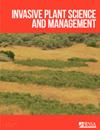Measuring the success of cross-tenure collaborative weed management: insights codeveloped with practitioners
IF 1.3
4区 生物学
Q3 PLANT SCIENCES
引用次数: 1
Abstract
Abstract There is limited documentation of cross-tenure collaborative weed management programs, and no consistent set of metrics for evaluating their performance. In this study, 12 weed management practitioners in southeast Australia participated in a qualitative social research project to discuss and document examples of cross-tenure collaborative weed management and critically reflect on whether existing metrics are suitable for evaluating the performance of their programs. Analysis of focus group discussions, project documentation, subsequent reflections, and review of the literature reveal that weed management practitioners, in Australia and elsewhere, mostly rely on metrics that measure weed management inputs, such as herbicides, labor, and costs. Metrics used to evaluate social outcomes focus on benefits for individuals rather than social relationships or achievement of equitable outcomes. Social research on collaborative governance and social science methods more broadly, such as social network analysis and collective narratives, could be used by weed management practitioners to better evaluate and explain social–ecological outcomes over time.衡量跨任期合作杂草管理的成功:与从业者共同开发的见解
摘要跨任期合作杂草管理计划的文献有限,也没有一套一致的指标来评估其绩效。在这项研究中,澳大利亚东南部的12名杂草管理从业者参与了一个定性社会研究项目,以讨论和记录跨任期合作杂草管理的例子,并批判性地反思现有指标是否适合评估其项目的绩效。对焦点小组讨论、项目文件、后续反思和文献综述的分析表明,澳大利亚和其他地方的杂草管理从业者主要依赖于衡量杂草管理投入的指标,如除草剂、劳动力和成本。用于评估社会结果的指标侧重于个人利益,而不是社会关系或公平结果的实现。杂草管理从业者可以使用更广泛的合作治理和社会科学方法的社会研究,如社会网络分析和集体叙事,来更好地评估和解释一段时间以来的社会生态结果。
本文章由计算机程序翻译,如有差异,请以英文原文为准。
求助全文
约1分钟内获得全文
求助全文
来源期刊

Invasive Plant Science and Management
PLANT SCIENCES-
CiteScore
2.20
自引率
9.10%
发文量
24
审稿时长
6-12 weeks
期刊介绍:
Invasive Plant Science and Management (IPSM) is an online peer-reviewed journal focusing on fundamental and applied research on invasive plant biology, ecology, management, and restoration of invaded non-crop areas, and on other aspects relevant to invasive species, including educational activities and policy issues. Topics include the biology and ecology of invasive plants in rangeland, prairie, pasture, wildland, forestry, riparian, wetland, aquatic, recreational, rights-of-ways, and other non-crop (parks, preserves, natural areas) settings; genetics of invasive plants; social, ecological, and economic impacts of invasive plants and their management; design, efficacy, and integration of control tools; land restoration and rehabilitation; effects of management on soil, air, water, and wildlife; education, extension, and outreach methods and resources; technology and product reports; mapping and remote sensing, inventory and monitoring; technology transfer tools; case study reports; and regulatory issues.
 求助内容:
求助内容: 应助结果提醒方式:
应助结果提醒方式:


